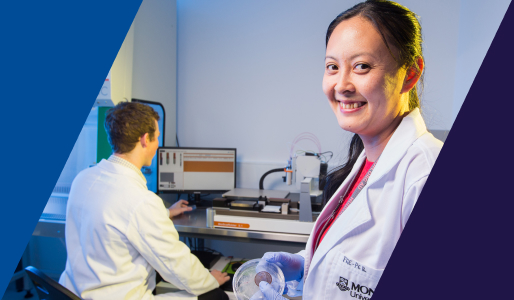COVID-19 research
Medical research continues to play a vital role in the global response to the COVID-19 pandemic. As a world leader in medical research, Victoria is at the forefront of this response.
Since the start of the pandemic, the Victorian Government has committed over $35 million in funding to support COVID-19 research.
Victorian COVID-19 Research Fund
The Victorian COVID-19 Research Fund was initially established with $5.5 million to support the work of Victoria’s research institutes to better understand transmission, immunity and the long-term health impacts of COVID-19. An additional $13.3 million in funding was announced for COVID-19 research projects in December 2021.
COVID-19 Treatment Research Grants – December 2021
A six-month study by University of Melbourne, Monash University and Northern Hospital that will explore off-label use of a heparin-based nasal spray in COVID infected households.
New trials will research antiviral cocktails to protect immunocompromised patients from COVID-19, as well as in defend against vaccine evading variants.
A study on a suite of immune stimulating virus decoy biologicals with the ability to neutralise and kill the COVID virus and virus infected cells and a study focused on manufacturing antibodies and testing their efficacy in blocking the transmission of COVID-19 infection
A study to explore treatments for severe inflammatory effects of tissue damage, an identified long term health impact of COVID-19.
A study to determine if anti-GM-GSF antibody Lenzilumab can improve outcomes for Victorian patients in hospital with COVID-19.
Four studies will be supported to establish the profiles of Victorian children with COVID-19, as well as research potential impacts of vaccinations in children and alternative treatment methodologies.
Stream A – Biomedical research into long-term impacts of COVID-19
The Murdoch Children's Research Institute (MCRI) is using human-derived stem cells to better understand the virus’s effects on different organ systems in the body to support the development of targeted treatments. The multi-agency study includes partners from the Doherty Institute, Monash University, and the Walter and Eliza Hall Institute.
The Burnet Institute, in partnership with the Doherty Institute, aim to improve our understanding of COVID-19 immunity by providing a tool that helps to assess immunity for partial or total protection from reinfection.
The University of Melbourne and the Doherty Institute are undertaking a study to define immunity to COVID-19 and generate knowledge to enable the development of better vaccines and biotherapies for the community.
Barwon Health is undertaking a research study in regional Victoria to determine the long-term biological, physiological, and psychological impacts of COVID-19 infection on a regional population.
Stream B – Cohort studies into the long-term impacts of COVID-19 on groups at risk of increased exposure such as healthcare workers
Alfred Health is working with Monash Partners to examine the long-term physical and psychosocial impacts of COVID-19 on our frontline workers and workplaces with a focus on healthcare and aged care. This research aims to inform workplace practices and approaches to prevent transmission of COVID-19 and inform the best support for the workforce.
Eastern Health is partnering with Deakin University and Monash University to investigate the impacts of COVID-19 on frontline workers and the wellbeing of Victorian healthcare staff and their families. This research aims to inform mental health supports for this workgroup, prevent significant illness and effectively direct resources where needed.
Bendigo Health is undertaking a study in regional Victoria to determine the long-term impacts of COVID-19 infection on the rural and regional health care workforce and the communities in which they live. This research is being carried out in partnership with La Trobe University and aims to inform future policy and practices to support these health care workers and their communities.
Other COVID-19 research projects
The antiviral research is comprised of three streams working to establish new tools and assay to test drugs for antiviral activity against SARS-CoV-2 and to apply structural biology to optimise candidate drugs.
Diagnostics research for the development of functional prototype point-of-care tests to rapidly identify recent infection and likely immunity to COVID-19.
The Optimise Study is providing empirical data to guide the State and Federal Governments’ COVID-19 public health response strategies, including producing rapid modelling to inform public health directions.
Establishment of an alliance and environment to support the acceleration of COVID-19 clinical trials in Victoria. The Vax4COVID alliance has attracted clinical trials for COVID-19 vaccine studies to Victoria.
A cohort study for the long-term impacts of COVID-19 on children and families.
Establishment of a collaborative partnership to facilitate a healthcare recovery initiative within the Victorian health system.
Based in Melbourne, the Living Evidence Consortium is a world-first collaboration that brings together leading experts in evidence synthesis, guideline development and digital technologies, to provide reliable, accessible and up-to-date evidence in health.
The Consortium focuses on the evidence-based delivery of clinical guidelines to frontline healthcare workers in response to the COVID-19 pandemic.
Associate Professor Wai-Hong Tham and her colleagues are developing new antibody-based therapies to prevent and treat COVID-19. Associate Professor Tham said her research program is searching for new antibodies that could prevent – or treat – infection with SARS-CoV-2, the virus that causes COVID-19.
This research is taking a new approach to antiviral drug discovery and management of viral infections by targeting cell processes, rather than viral replication, which if successful might allow repurposing of drugs developed for other indications as curative COVID-19 treatments
Developing a low-cost, regenerative medicine for extremely premature babies at high risk of developing severe and chronic respiratory disease. The research has broader applications beyond premature babies, addressing other urgent unmet medical needs which could include COVID-19.
Page last updated: 15 April 2024
